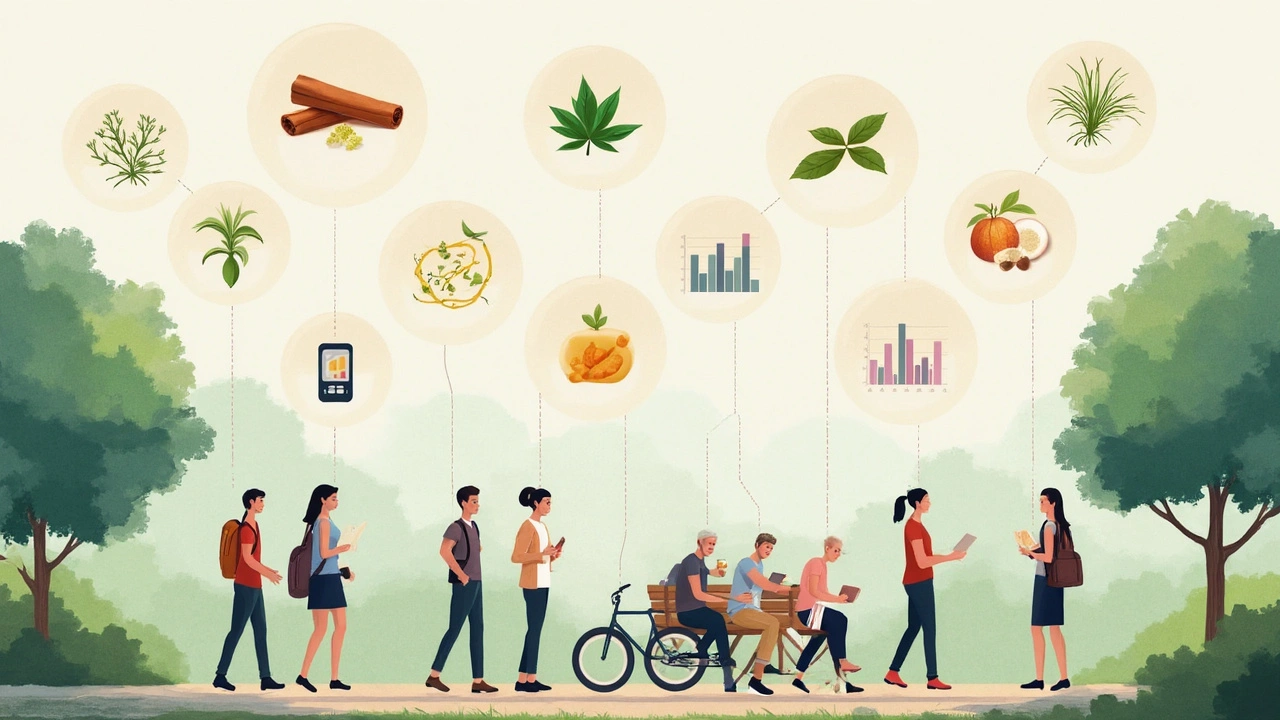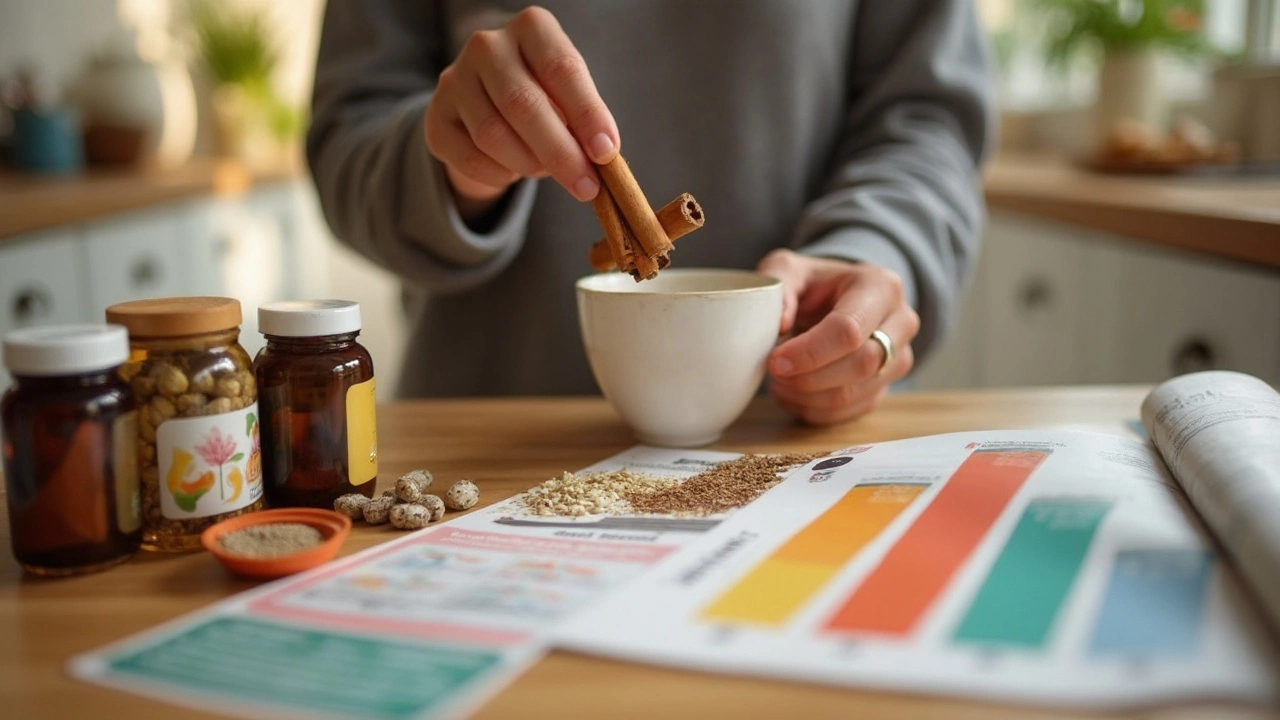Why Are People Searching for Herbal Metformin Substitutes?
Metformin dominates the diabetes world as the go-to prescription drug for lowering blood sugar, but it doesn’t work for everyone. Some folks just can’t tolerate the side effects—think gut issues, metallic taste, or that persistent nausea. Others are fed up with prescriptions or simply want a more natural approach. And honestly, who isn’t at least a little curious when you hear spices you already have at home, like cinnamon, might help regulate blood sugar?
It’s not just hype: Surveys show that more than one-third of people with diabetes try supplements or alternative therapies in hopes of better sugar control. Out of these, many gravitate toward botanicals like fenugreek, cinnamon, bitter melon, and gymnema sylvestre. Why these? Because there’s actually some science—real human trials—supporting their use, at least for some people.
One striking fact: In 2020, Google Trends saw a surge in searches like “natural substitutes for Metformin” and “herbal glycemic control.” So, this isn’t a fringe interest. Hospitals and dietitians are catching on too, as patients show up with bottles of powders and tinctures, eager to talk about anything besides another prescription.
Supplements aren’t magic bullets. The FDA doesn’t regulate them as strictly as pharmaceuticals, so quality can be hit or miss. Still, the interest is real, and clinical studies on specific herbs aren’t hard to find these days. So, let’s break down what actually works, what might work, and which herbs are nothing more than expensive kitchen spices.
Cinnamon: More Than Just a Spice for Diabetics?
If you’ve sprinkled cinnamon on your oatmeal hoping it does more than just taste great, you’re not alone. Out of all possible metformin substitutes, cinnamon might be the most talked about—and the most researched. There’s a reason: it’s cheap, available everywhere, and has shown blood sugar-lowering effects in several clinical trials.
Let’s get concrete: A 2019 meta-analysis looked at 16 randomized controlled trials involving over 1200 volunteers with type 2 diabetes or prediabetes. The consensus? Daily cinnamon supplementation (usually Cinnamomum cassia, not the sweeter Ceylon kind) led to a statistically significant drop in fasting blood glucose and HbA1c levels. The effect size varied, with some seeing drops as impressive as those from first-line meds, while others had more modest results.
The magic seems to be in compounds called polyphenols, which boost insulin sensitivity and slow glucose entering the bloodstream after meals. More good news: Cinnamon might also lower bad cholesterol, giving it a bonus for those with metabolic syndrome.
But wait—the details matter. Too much of the common supermarket cinnamon (cassia) contains coumarin, which can harm your liver in high doses. Experts usually recommend sticking to under a teaspoon per day, or going for Ceylon cinnamon, which has lower coumarin content. There’s no universal dose, but clinical studies often use between 1 and 6 grams per day (around ½ to 2 teaspoons).
One person’s cinnamon success story doesn’t guarantee yours, though. Some people respond better than others. If you’re hoping for a “natural Metformin,” cinnamon can help—but it’s not a replacement for a healthy diet, regular movement, and proper medical supervision.
If you want an up-to-date rundown of the best metformin substitutes—including more options and tips on how to choose—the linked guide covers trustworthy alternatives in greater detail.

Fenugreek: The Underrated Seed for Glycemic Control
This humble kitchen spice is a staple in Indian cooking, but only recently has it been making waves in diabetes research circles. Fenugreek contains soluble fiber, which can slow digestion and help the body absorb carbs more gradually. More than that, its seeds have a chemical called 4-hydroxyisoleucine, which boosts insulin release. Not bad for a plant you can buy in bulk for a few bucks.
Let’s get specific. A well-cited double-blind study from 2017 measured the effects of fenugreek in 140 people with poorly controlled diabetes. After taking 10 grams of powdered seeds daily for three months, their fasting blood sugar dropped significantly, as did their HbA1c. Another trial from India found that even people with prediabetes cut their risk of developing type 2 diabetes in half by taking 5 grams of fenugreek seed powder twice daily for three years.
So how do you actually use it? Most studies grind up the seeds and add them to food or mix with water. As a supplement, you’ll usually see dosages between 1,000 and 2,500 mg per day in capsule form. Folks often complain about the smell—seriously, even your sweat might smell like maple syrup—but that’s a small tradeoff if your sugars tumble into the healthy zone. Some struggle with gas or bloating when first starting out, so starting low and building up can help.
If you’re looking at powders or capsules, check if they use standardized extracts (often labeled at 50% saponins) to get more bang for your buck. Combining fenugreek with cinnamon seems to have an additive effect, though research on stacking botanicals is still in its infancy. Long story short: fenugreek isn’t just folklore, it has real clinical clout but works best for people willing to stick with it for weeks, not just days.
| Study | Participant Type | Dosage | Duration | Blood Sugar Reduction |
|---|---|---|---|---|
| 2017 India (Shaikh et al.) | Type 2 Diabetes | 10g/day | 3 months | 15% lower FBG* |
| 2016 (Pre-diabetes) | Pre-Diabetic | 10g/day | 6 months | Incidence dropped by 50% |
*FBG = Fasting Blood Glucose
Other Botanicals Worth Considering: Bitter Melon, Berberine, and Gymnema
Cinnamon and fenugreek steal the spotlight, but several lesser-known herbs have some rock-solid data, too. Bitter melon—the warty green fruit you’ve probably seen in Asian supermarkets—gets a lot of buzz in diabetes care. Its key bioactive is called charantin, and studies suggest it works a little like insulin, helping sugar move into cells more efficiently. A 2022 review showed consistent reductions in fasting blood glucose, often in the 10-20% range for people taking 2,000 mg of extract per day. Some even compare bitter melon’s effect to metformin, although the results aren’t always as dramatic, and taste is definitely an acquired thing.
Then there’s berberine, found in plants like goldenseal and barberry. This one is probably the closest thing you’ll find to a herbal metformin. Multiple meta-analyses show that 1,500 mg a day of berberine can slash HbA1c by around 1%, rivaling low-dose metformin itself. Unlike most herbs, berberine has pretty robust safety data, but it can interact with many medications. So, heads up: always check with a healthcare provider before layering it onto complex meds.
Gymnema sylvestre, often called the “sugar destroyer” in Ayurvedic medicine, does just what it sounds like—it can lessen your taste for sweets and drop your blood sugar. Some report that chewing the leaves makes candies taste bland. A 2021 double-blind trial reported that gymnema extract improved both fasting and post-meal glucose readings in people with uncontrolled diabetes, making it a solid choice for anyone tired of sugar cravings driving their levels up.
- Bitter Melon: Best for folks who don’t mind bold flavors and want a food-based method.
- Berberine: Good alternative for people okay with capsules, but medication interactions are a risk.
- Gymnema: Might appeal to those fighting sugar cravings and looking for multi-layered glycemic support.
Plenty of folks combine these herbs for a stronger effect, but there’s risk to “herbal stacking” without knowing how different extracts interact. And remember, supplement quality is all over the map—cheap imports might not contain the actual active ingredients. Check for third-party testing or products with detailed labeling before betting your health on a bottle.
"The strongest clinical evidence for botanicals as glycemic agents comes from standardized extracts with clear dosage and duration—unregulated, unstandardized supplements just don’t deliver the same punch." – Dr. Stephen Devries, Executive Director of the Gaples Institute

Smart Tips for Trying Herbal Glycemic Agents
You don’t need a chemistry degree to try botanicals, but a smart plan helps. First, pick one herb at a time and track your blood sugar every morning for at least two weeks. This way you’ll know if the supplement is really working for you—everyone reacts differently depending on their metabolism, diet, and even gut bacteria.
Start with a conservative dose, especially if you’re already using prescription meds. Herbs like berberine and gymnema may lower blood sugar too much when combined with metformin or insulin—cue the hypo warnings. If you feel dizzy, shaky, or extra tired, cut back and talk to a health pro.
For cinnamon, stick to under 6 grams per day (about two teaspoons), and look for Ceylon if you plan to use it daily. With fenugreek, ramp up slowly to a daily dose of 10 grams of seed or 2,000 mg of extract—start lower if you’re sensitive to GI upset. Berberine works best split into two or three doses per day; most studies use about 500 mg with meals.
Here are some practical do’s and don’ts with herbal metformin substitutes:
- Do track your blood sugar regularly!
- Do inform your doctor, especially if you’re on prescription diabetes meds.
- Don’t expect overnight miracles—herbs can take weeks to show a difference.
- Don’t buy sketchy brands or bulk powder from unknown sources; quality matters.
- Do pair any supplement with a lower-carb, balanced diet for best results.
If cost is a concern, bulk herbs from reputable shops are often cheaper than standardized capsules, but with less certainty about potency. If you want a side-by-side look at the top contenders—including pros, cons, and dosing tips—there’s a detailed review of reliable metformin substitutes that’s worth your time.
Bottom line: Nature’s pharmacy has more for blood sugar control than it gets credit for. Cinnamon, fenugreek, and their lesser-known botanical cousins absolutely have a place in the diabetic toolkit—sometimes as stand-alone support, sometimes alongside meds. But safe experimenting is the name of the game, and tracking your numbers keeps everything honest.


This article is a good start, but let's be real — relying on natural herbs like cinnamon and fenugreek instead of scientifically proven medications like Metformin is a risky gamble for people with serious blood sugar issues! The entire pharmaceutical industry has been demonized unnecessarily. Metformin has decades of track record while these alternatives don't have that rigorous backing. People should be cautious and not fall for these "natural" solutions without consulting their doctors!!!
Also, the supplement market is a wild west — quality and dosages are all over the place. You could easily be wasting money or even harming yourself.
Just because something is natural doesn't mean it's safe or effective enough to replace actual medicine.
My dear friends, I must express an enthusiastic endorsement of this comprehensive article dissecting the virtues of botanical alternatives for glycemic regulation. It is profoundly heartening to witness that centuries-old phytotherapeutic wisdom is being subjected to rigorous scientific scrutiny rather than dismissed outright.
The integration of clinical evidence with traditional knowledge provides a balanced, sophisticated understanding necessary for judicious decision-making regarding diabetes management. Cinnamon and fenugreek, with their bioactive compounds potentially augmenting insulin sensitivity, deserve a place in the armamentarium of holistic approaches.
However, it is imperative that patients engage with healthcare professionals to harmonize such supplements with conventional treatments, thereby ensuring safety and efficacy.
What struck me most about this piece is how it doesn't just dive into the science but also brings in the lived experiences and practical tips. That holistic approach really makes it accessible and hopeful!
I've always believed that managing blood sugar shouldn't just be about pops and pills but a broader conversation — diet, lifestyle, and yes, sometimes herbs that nature offers us with care and respect. It’s exciting to see evidence backing that up!
Of course, caution is key, but the possibilities open up a whole new avenue for those seeking gentler, more natural ways to support their health.
You realize, don't you, that all this talk about herbal alternatives is part of a bigger narrative designed to distract us from the real manipulations happening in Big Pharma and the government? They're constantly pushing pills and patents while suppressing natural, cost-effective remedies like cinnamon and fenugreek because these threaten their profits.
I've done the deep dives into the patents and research they quietly shelve. This article is quite subtle in affirming these botanicals' value, but don't be fooled — the real cure is being hidden from you.
We have to be vigilant and demand transparency before settling for medications that might be more about control than curing.
Hey folks, this article really provides some solid info for anyone wanting to explore natural ways to control blood sugar. I've coached a bunch of clients who were frustrated with meds and wanted to try something more holistic. Cinnamon and fenugreek have some compelling research and when combined with lifestyle tweaks — they can really help.
Of course, nobody is suggesting ditching prescribed meds without professional guidance, but this is a great supplement on the toolkit front. Just remember, supplements are just one ingredient in your recipe for health.
Keep experimenting smartly and stay consistent!
hey gotta say this herbal thang sounds cool but gonna need more proof before i switch from my metformin lol its been solid for me but i always down some cinnamon tea after meals its tasty and feels like doing sum good. fenugreek tho i heard it can help with milk production? wonder if anyone here tried these herbs as a full swap or just a side kick with meds?
also found some pills that are mixes of these herbs but man the ingredients list is long and confusing lol whats best way to pick legit ones? any tips to avoid fakes? tell me if u got stories or nightmares on this!
Hi everyone. I've been managing type 2 diabetes for a while and have always taken a measured approach to experimenting with alternatives. This article's exploration of herbal options like cinnamon and fenugreek resonates with my inclination toward complementary strategies. However, I advise approaching these alternatives with care and ensuring that any change from conventional medication is done under medical supervision.
Additionally, different individuals may respond differently to these supplements; what works for one might not for another. Consistent monitoring of blood glucose levels is crucial when incorporating herbal supplements into diabetes management.
Ultimately, integration rather than substitution is often the safest path.
Honestly, the whole obsession with natural alternatives to Metformin smacks of pretension. It's not enough to claim 'clinical evidence' without scrutinizing the quality and scale of the studies cited. Most of these herbal remedies have been hyped endlessly without rigorous randomized controlled trials that truly convince.
Furthermore, the placebo effect likely plays a huge role in user reports. One ought to approach such claims with a healthy dose of skepticism instead of jumping on the latest 'holistic' bandwagon. Pharmaceuticals have standards and regulations; these botanicals do not.
Seriously! People need to understand that what this article presents is not a silver bullet! Cinnamon and fenugreek may have some effects but without rigorous clinical testing and certification, relying on these is just foolishness!!!
We cannot just turn our backs on proven medication like Metformin that millions benefit from!!! The temptation to jump to 'natural' remedies often ignores the complex nature of diabetes and the need for structured medical intervention!!!
It is irresponsible to promote such alternatives without emphasizing the critical need for proper physician oversight and biochemical monitoring!!!
Nice thread here. I've been dabbling in some of these herbal supplements for my blood sugar control, and I appreciate articles that bring solid research to light. That said, it’s essential to remember that the human body is complex, and what works in one study might not translate universally.
I'm curious if anyone here has noted interactions between experimental herbal regimes and their existing meds? It's tricky territory, so always best to have a knowledgeable doc in the loop.
man these herbs might be some kinda miracle, but it also feels like a trap of misinformation sometimes. from what i've read, cinnamon can help a bit but not like a magic cure right? the whole thing smells like some elder herbalist's tale mixed with just enough science to hook folks desperate for an easy fix.
and fenugreek, i've seen ads online that promise moonlight and sunshine with it. it's probably more about lifestyle than some cinnamon stick in your tea. i just hope people stay aware that these things are supplements not spellbooks lol